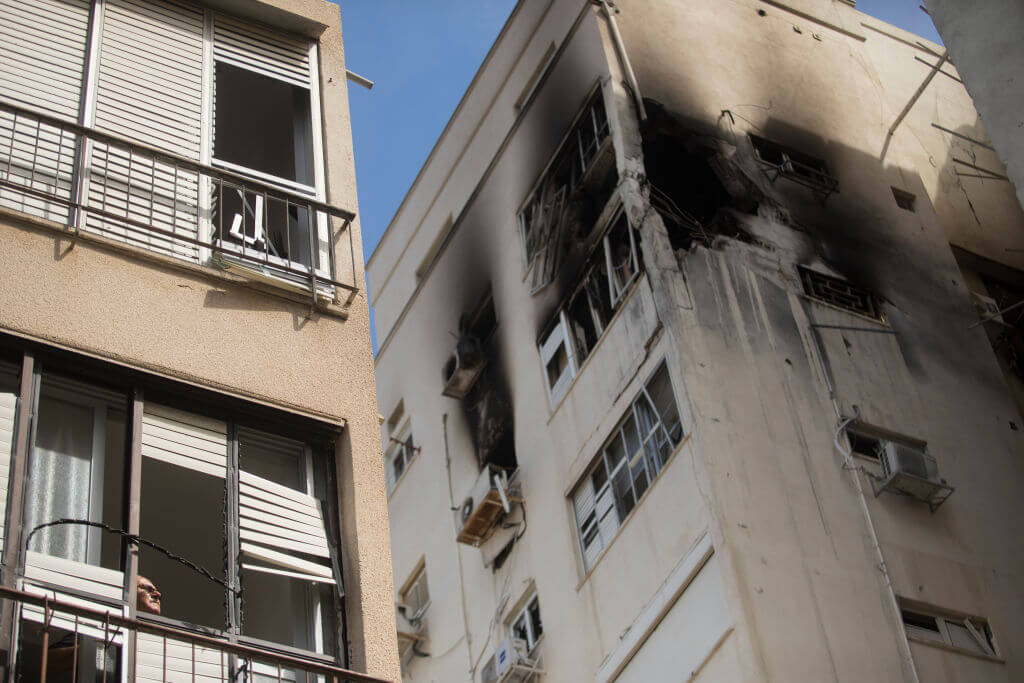With Israel and Gaza at war, trivial matters can restore our empathy
Like tzitzit, minor irritations of everyday life can be reminders of our place in the world — and to work to repair it.

A building in Tel Aviv hit by a missile Oct. 7. Photo by Amir Levy/Getty Images
This morning, I woke up to my usual routine: On my bathroom sink, an eighth-inch of pool of water was under the left faucet as always, annoying me that the plumbers had messed up years ago. That reminded me of a more immediate to-do: Ridding my basement of the moldy smell after recent flooding.
Then I picked up my iPhone and read about the rocket attacks in Israel.
I also saw a text from a friend visiting the country. He wrote to me in the middle of the night, just before the rockets hit. I wrote back and learned he was OK. Obviously, now there were bigger things to worry about than my plumbing issues.
The Israelis and Palestinians, and others caught in the crossfire, know that all too well. But that doesn’t stop those of us outside of war zones from obsessing over daily concerns, or letting them shape the ways we view the world.
Shortly after the Russian attack on Ukraine nearly two years ago, the western media was criticized for coverage that seemed to over-emphasize the horrors compared to similar atrocities in the underdeveloped world.
Many critics suggested it was due to overt or subconscious racism; white reporters, their editors and their audiences are more sympathetic to those that look like them.
Call it developed world privilege, or guilt. But I can’t stop wondering how many refugees who narrowly escaped with their lives had been especially proud of a bookcase they once installed, or a hardware store item they meant to pick up that doesn’t matter the least bit now.
Bias informs unbalanced coverage of news on a good day: How often are there reports about missing little white girls but not missing Black ones? But I also think the devastation in Ukraine hit home in the developed world because the blinking traffic signals on streets laden with husks of burnt-out tanks looked just like our intersections, and the collapsed homes also mirrored ours — complete with minor plumbing issues that must have similarly obsessed the occupants before the missiles hit.
Call it developed world privilege, or guilt. But I can’t stop wondering how many refugees who narrowly escaped with their lives had been especially proud of a bookcase they once installed, or a hardware store item they meant to pick up that doesn’t matter the least bit now.
Jews and Palestinians don’t need to imagine a there-but-for-the-grace-of-God scenario to relate to another shooting war in Israel and Gaza. Our communities are intrinsically connected to the rocket attacks and retaliatory strikes. Some of us will lose loved ones, many more will personally know someone maimed, and even more will know a terrified child or family seeking safety in a shelter.
I’ve written before how, as a teen, our seemingly vital concerns seemed meaningless when we walked out of shul to learn the Yom Kippur War had begun. So you’d think I’d know by now to separate the trivial from the horrific realities of life and death.
But small things — like tzitzit, or mezuzot, or tefillin — are symbols to remind us of the divine and our place in the universe.
And every time I see that pool of water on the sink, I can’t stop thinking about war — and what everyone must do to end it.
A message from our CEO & publisher Rachel Fishman Feddersen
I hope you appreciated this article. Before you go, I’d like to ask you to please support the Forward’s award-winning, nonprofit journalism during this critical time.
We’ve set a goal to raise $260,000 by December 31. That’s an ambitious goal, but one that will give us the resources we need to invest in the high quality news, opinion, analysis and cultural coverage that isn’t available anywhere else.
If you feel inspired to make an impact, now is the time to give something back. Join us as a member at your most generous level.
— Rachel Fishman Feddersen, Publisher and CEO